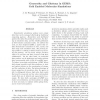Free Online Productivity Tools
i2Speak
i2Symbol
i2OCR
iTex2Img
iWeb2Print
iWeb2Shot
i2Type
iPdf2Split
iPdf2Merge
i2Bopomofo
i2Arabic
i2Style
i2Image
i2PDF
iLatex2Rtf
Sci2ools
102
click to vote
HPDC
2005
IEEE
2005
IEEE
Generosity and gluttony in GEMS: grid enabled molecular simulations
Biomolecular simulations produce more output data than can be managed effectively by traditional computing systems. Researchers need distributed systems that allow the pooling of resources, the sharing of simulation data, and the reliable publication of both tentative and final results. To address this need, we have designed GEMS, a system that enables biomolecular researchers to store, search, and share large scale simulation data. The primary design problem is striking a balance between generosity and gluttony. On one hand, storage providers wish to be generous and share resources with their collaborators. On the other hand, an unchecked data producer can be gluttonous and easily replicate data unnecessarily until it fills all available space. To balance generosity and gluttony, GEMS allows both storage providers and data producers to state and enforce policies on the consumption of storage and the replication of data. By taking advantage of known properties of simulation data, t...
| Added | 24 Jun 2010 |
| Updated | 24 Jun 2010 |
| Type | Conference |
| Year | 2005 |
| Where | HPDC |
| Authors | Justin M. Wozniak, Paul Brenner, Douglas Thain, Aaron Striegel, Jesús A. Izaguirre |
Comments (0)

